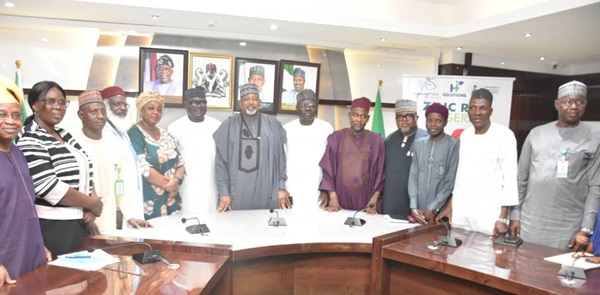
The Federal Government has announced the official release of zinc-enriched rice varieties – Faro 71 and Faro 72 – as part of efforts to improve food and nutrition security across Nigeria. Minister of Agriculture and Food Security, Senator Abubakar Kyari made this known during a briefing held at the ministry’s headquarters in Abuja, describing the release as a landmark step in combating micronutrient deficiencies, particularly zinc deficiency, among vulnerable populations.
Kyari emphasised that the newly released varieties are not only biofortified with higher zinc content but are also high-yielding, drought-tolerant and resistant to pests and diseases. Their adaptability to both savanna and rainforest ecologies, he said, makes them a strategic tool for addressing the challenges facing Nigeria’s smallholder rice farmers, many of whom rely on rice for sustenance and income.
The minister noted that zinc deficiency remains a critical public health issue in Nigeria, contributing to widespread malnutrition, especially among children and women. He cited nutrition surveys revealing that around 68 per cent of Nigerian children under five suffer from anaemia, with zinc and iron deficiency playing major roles. The national stunting rate among children under five stands at a troubling 37 per cent, further underlining the urgency of nutritional interventions.
Kyari stressed that poor zinc intake weakens the immune system, stunts growth, and contributes to maternal health complications, poor birth outcomes and diminished productivity. He said the introduction of zinc-enriched staple crops like Faro 71 and 72 offers affordable, accessible and effective ways to boost micronutrient intake and improve public health outcomes.
Developed through a partnership between the ministry, HarvestPlus, HarvestPlus Solutions and the National Cereals Research Institute (NCRI), the release of these varieties marks the first time that biofortified zinc rice has been introduced not just in Nigeria but in Africa. The effort was supported by the British Government’s Foreign, Commonwealth & Development Office (FCDO), the Propcom+ project and the Alliance for a Green Revolution in Africa (AGRA).
The minister added that the initiative builds on similar success stories in Bangladesh and India, where families consuming zinc-rich rice have seen measurable improvements in nutrition. When consumed regularly, the Faro 71 and 72 varieties can supply up to 40 per cent of an individual’s daily zinc requirement, making them a practical solution to combat deficiencies. He said the initiative would also open new market opportunities for smallholder farmers, enhancing their livelihoods while providing healthier food to Nigerian consumers.
Kyari pledged the ministry’s continued collaboration with public and private institutions to promote widespread adoption and scaling of these nutrient-dense cereals. Earlier in the event, the permanent secretary of the ministry, Dr. Marcus Ogunbiyi hailed the achievement as a groundbreaking milestone, noting that Nigeria had become the first African country to successfully develop and release zinc-enriched rice.
Ogunbiyi underscored the significance of rice in Nigeria’s dietary landscape and emphasised the need to strengthen food and nutrition safety by enhancing the nutritional profile of the country’s most consumed staples.
HarvestPlus country director, Dr. Yusuf Dollah highlighted the organisation’s ongoing work with NCRI in producing early-generation seeds and integrating them into Nigeria’s formal seed systems. These seeds, he said, would be freely distributed to enable farmers to multiply and develop certified seeds suitable for commercial planting. He also outlined the next phase of the programme, which includes demand creation, field demonstrations and strategic partnerships to ensure nationwide access to the nutritious rice varieties.
Dollah noted that prices of the biofortified seeds would remain on par with traditional varieties, making them accessible to a broader segment of Nigerian farmers and consumers. He explained that the initiative operates in three phases – research and development, commercialisation and sustained support – to ensure long-term impact and availability.
A statement issued by the Ministry’s Director of Information, Mrs. Anthonia Eremah, noted that the launch event was attended by representatives from HarvestPlus Solutions, Propcom+, Biofarm, NCRI and AGRA, among others.
With this release, Nigeria has positioned itself as a continental leader in agricultural innovation, advancing solutions that blend science, nutrition and sustainability to address food insecurity and malnutrition. The government’s next steps will focus on scaling production, encouraging farmer uptake and driving policy support to entrench zinc rice as a key part of the national food basket.


